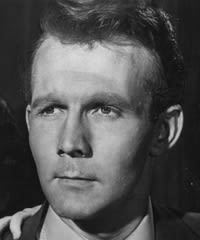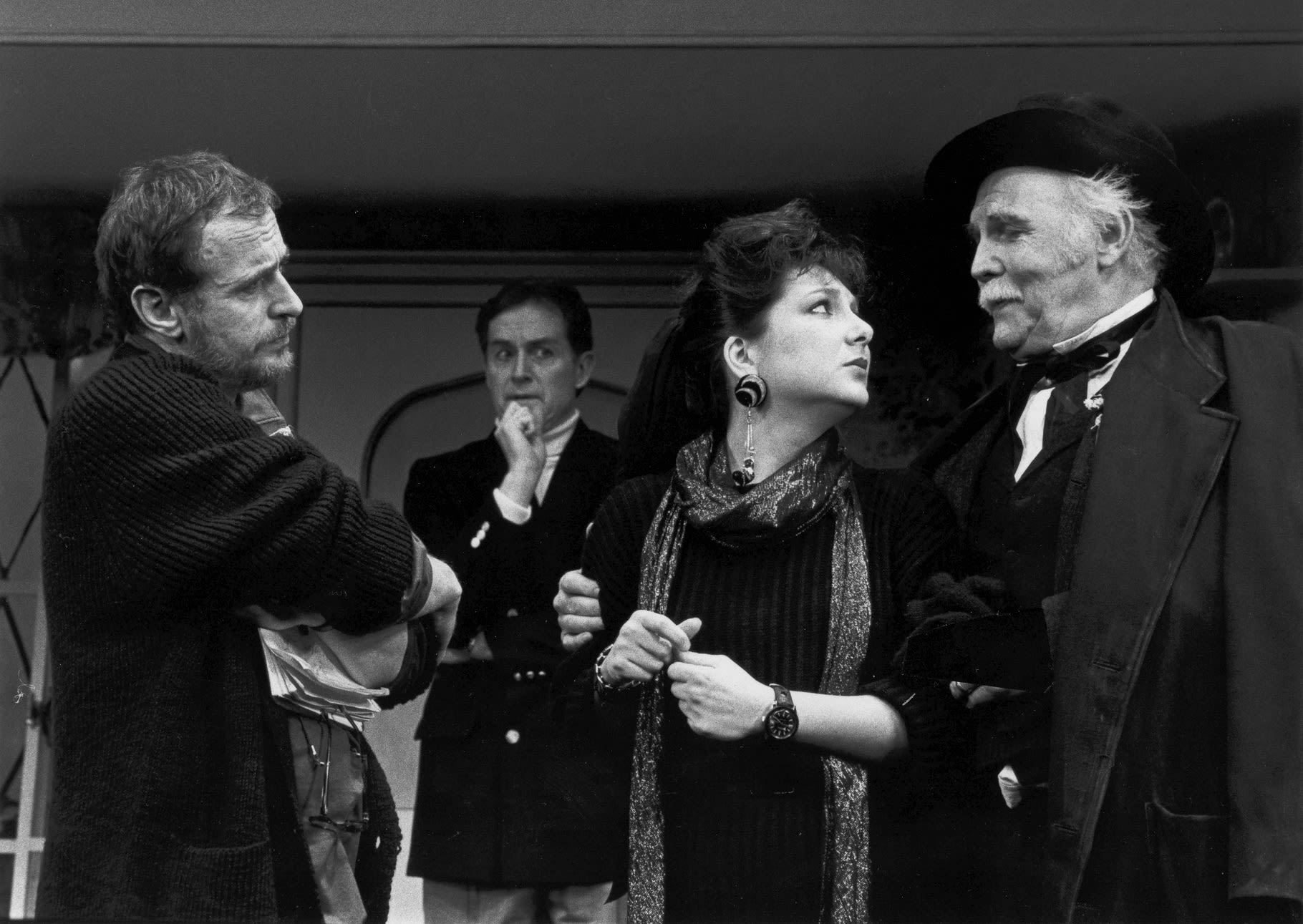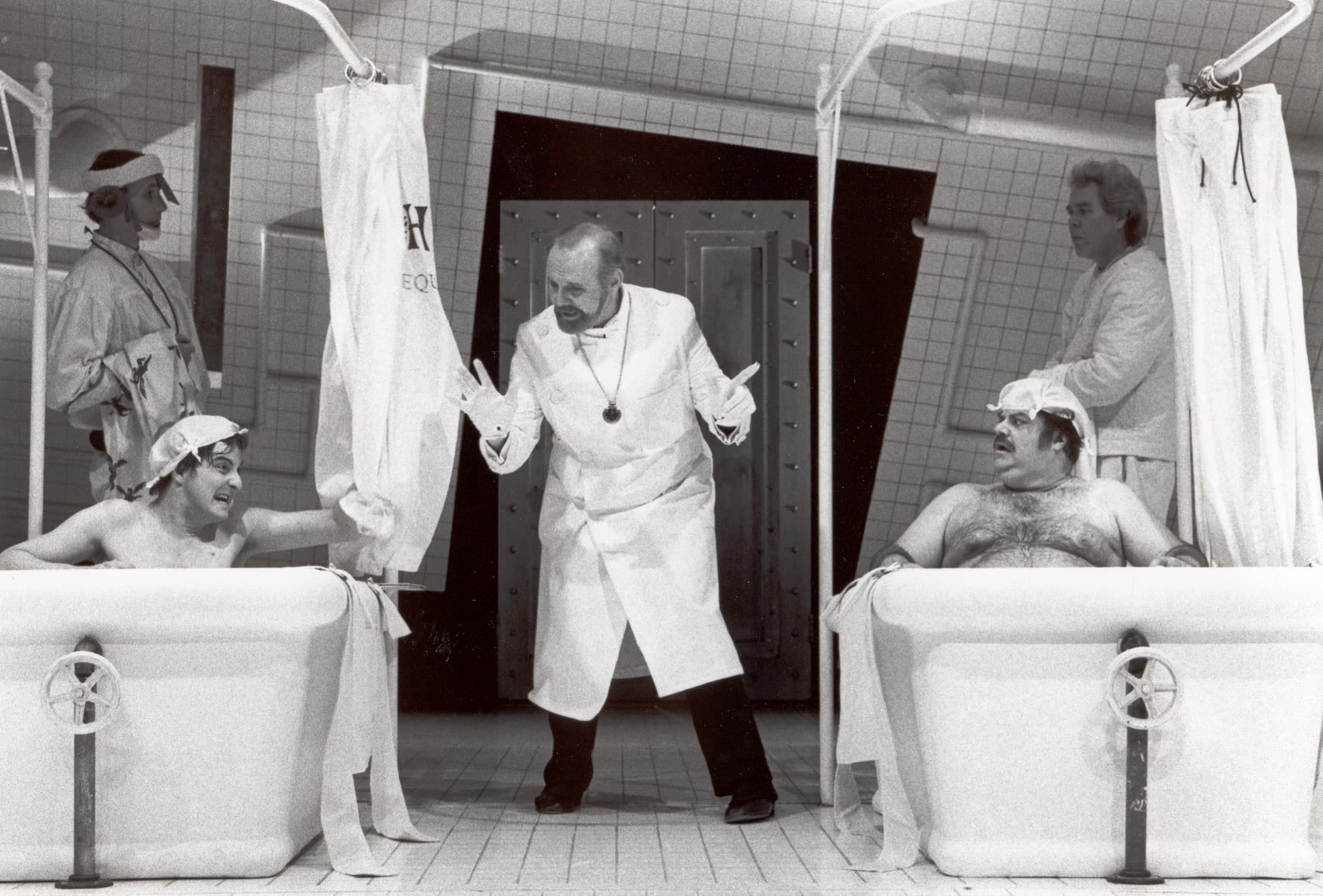Remembering Biff McGuire
"How profoundly lucky we all are that he chose to spend a significant portion of his deeply dedicated life making memories on the stages of Seattle Rep"
- Former Seattle Rep Associate Artistic Director Doug Hughes
Recently we lost our dear friend William "Biff" McGuire. Biff had a long history at Seattle Rep, having performed in over 30 productions including Saint Joan (1979/80), Noises Off, (1986/87), and A Flaw in the Ointment (1993/94). Biff is an integral part of Seattle Rep’s history and has left a lasting impact on the theater and film community. We will miss him dearly.

Former Artistic Director Daniel Sullivan and Associate Artistic Director Doug Hughes reflect on their memories of working with Biff on numerous Seattle Rep productions and his impact on the theater.
Former Seattle Rep Artistic Director Daniel Sullivan (1981-1997)
"In 1974, Biff and Jeannie (Carson) did a production of Life With Father at Seattle Rep. It was directed by the legendary George Abbott. Abbott was perhaps the most successful and beloved stage director of the 20th century. Biff had done many shows with him, and Abbott had agreed to do this old fashioned play with Biff and Jeannie because he enjoyed their company. This old valentine of a play was hardly a challenge for Abbott and as it approached the third week of a four-week rehearsal, Abbott approached Biff and said, 'Listen, the World Series starts tomorrow. You know how this play goes and I never miss a Series. If you need any advice I’ll be at my apartment.' He showed up for the opening two-weeks later. Biff had finished the job, Abbott’s team had won, and the show was a success."
Former Seattle Rep Associate Artistic Director Doug Hughes (1984-1996)
"On March 2, 1944 a comedy about prep school life called Bright Boy opened on Broadway at the now long vanished Playhouse Theater. The show was not a success. If it’s remembered at all it might be for the fact that it was one of several flops whose quick closes made room a year later for the triumphant Playhouse opening of The Glass Menagerie.
But Bright Boy has another distinction, it marked the New York debut of the 18-year-old William 'Biff' McGuire in the role of 'Sleepy' and thus the start of a career that was astonishing in its length, breadth, and depth.
Biff often said that he never planned anything; that he simply fell in love with the business, was bound and determined to make a life in it, and that things just happened. This always seemed charmingly disingenuous to me coming as it did from an actor I knew to be meticulous about every aspect of his work. Whatever his governing philosophy might have been, lots of things happened to the prodigiously gifted Mr. McGuire.

Biff McGuire and members of the cast of Noises Off (1986/87) at Seattle Rep. Photo by Chris Bennion.
Over seven decades he played scenes with Al Pacino in Serpico, with Steve McQueen in The Thomas Crown Affair, and with Alan Arkin in The Heart is a Lonely Hunter. With the exception of one lengthy stretch that is noted below, he was ubiquitous on TV from the late 1940s into the early 2000s. He worked constantly on Broadway and on the road, playing leading roles in plays and in musicals. In his seventies, he was honored with two Tony Award nominations.
The most wonderful thing that happened to Biff was being cast opposite the radiant Jeannie Carson in a 1960 revival of Finian's Rainbow. They were the loves of each other’s lives and their sixty-year partnership onstage and off was wondrous to behold.
Long ago, when I was Seattle Rep’s Associate Artistic Director, a fancy Hollywood casting director I’d known in college looked me up on a visit to Seattle. We met for breakfast. 'What the hell is Biff McGuire doing up here acting for next to nothing?' he asked me. 'If he were down in L.A., I’d have him working constantly for real money.'

Biff McGuire and members of the cast of A Flaw in the Ointment (1994) at Seattle Rep. Photo by Chris Bennion.
Yes, it could have gone that way. It’s very easy to imagine Biff comfortably and very lucratively ensconced in a sitcom in the eighties and nineties. But he and Jeannie made a choice. They decided that they were going to move to the Pacific Northwest and play Shakespeare, Shaw, Ibsen, O’Neill, Wilder, Miller, Williams, Kauffman and Hart, Synge, Chekhov, Friel, Stoppard, Moliere, and all manner of new work that graced Seattle Rep’s stages during their era.
Reserved, even shy in real life, Biff gained a nearly scary confidence once he stepped on a stage. He was one of the most relaxed actors in performance that I have ever worked with. He had a special gift for repose, for a commanding stillness in the midst of a play’s action that magnetized an audience.
I acted with him once. In 1989 I had sufficient gall to cast myself as Claudio in my own production of Measure for Measure. Biff played the Duke. He and I shared a moment in the Act III prison scene. It’s shameful to admit this but one night sitting on a bench beside Biff, nobly attempting to accept the fact of my imminent execution, my concentration vanished and I found myself thinking, 'My God, I have all the lines and this guy is just sitting there listening and he’s blowing me off the stage!'

Biff McGuire and Jeannie Carson in The Merry Wives of Windsor (1984/85) at Seattle Rep. Photo by Chris Bennion.
He was a great Falstaff in Dan Sullivan’s fantastic production of The Merry Wives of Windsor. Wonderful again as Gaev when Dan and he did The Cherry Orchard. I remember the delicious, baffled vanity he brought to the role of Leading Man when Liviu Ciulei directed Six Characters in Search of An Author. He was great with torrents of text. This was especially evident when he gave his thunderous but crystal-clear performance as Shotover in Adrian Hall’s production of Heartbreak House.
But to cite this or that performance misses the point. For Biff, it was about transformation, constant practice, a body of work. Acting, I once heard him say was simply 'the making of memories.' How profoundly lucky we all are that he chose to spend a significant portion of his deeply dedicated life making memories on the stages of Seattle Rep."
